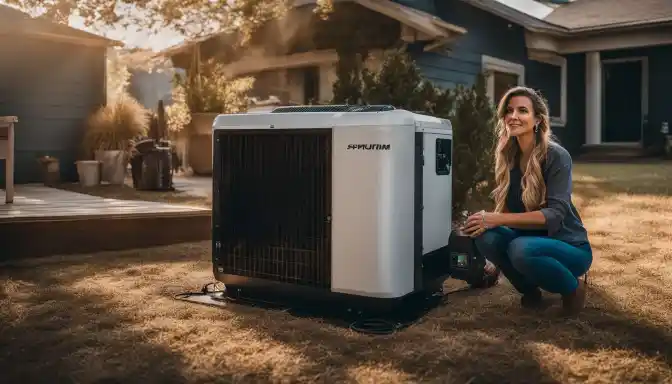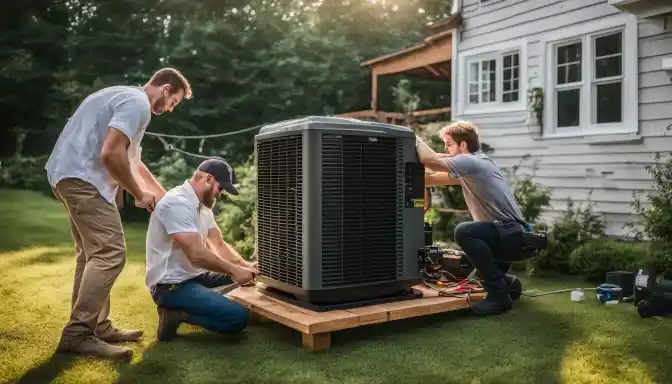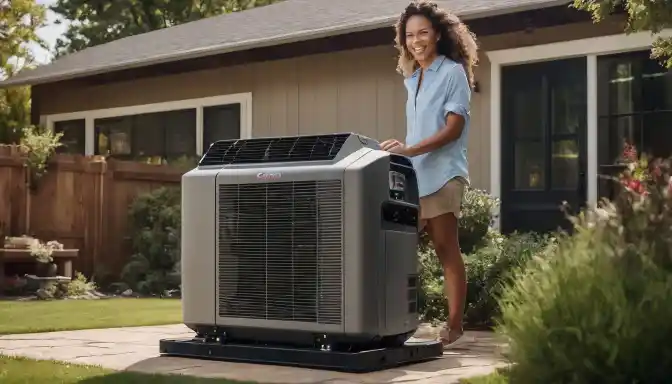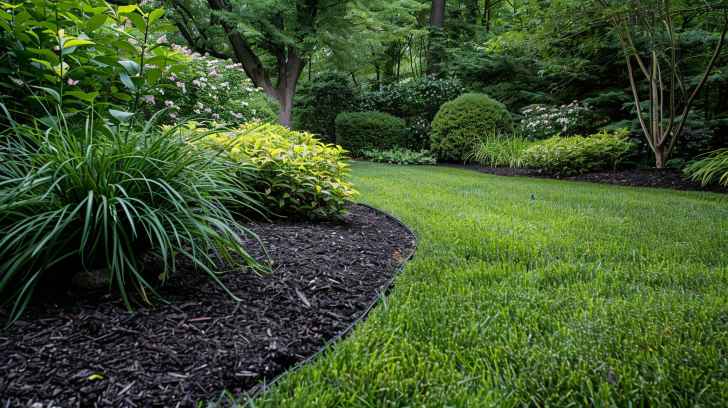As winter storms brew or summer blackouts loom, the thought of a silent house without heat or air conditioning is enough to spur any homeowner into action. You’ve worked hard for your cozy sanctuary; it’s natural to want a reliable safety net when power outages threaten your comfort and security.
With severe weather events becoming more frequent, investing in a whole-house generator has transformed from luxury to necessity for many, especially if you’re among the senior homeowners who prioritize uninterrupted living.
The cost of adding this powerful ally to your home can be quite an investment—with equipment costs ranging from $5,000 to $20,000 before even accounting for installation. But don’t let those numbers scare you! Understanding the ins and outs of whole house generator pricing doesn’t have to be complicated.
This guide aims to break down everything that impacts the price tag—from size and fuel type to installation complexities—helping you make an informed decision that fits both your needs and budget.
Get ready; peace of mind could just be one read away!
Key Takeaways
- Whole – house generators cost between $4,000 to $25,000 including installation, with most people paying around $9,000.
- The size of the generator you need will affect the price; bigger generators cost more but can power more of your home during an outage.
- Brands vary in price based on quality and reputation; well-known brands might be pricier but could offer better reliability and customer service.
- There are extra costs like fuel type—diesel, gas, propane or natural gas—and ongoing maintenance that can impact total expenses.
- Saving money is possible by choosing a smaller generator for less energy needs and comparing professional installation rates.
Average Cost of Whole House Generator

You might pay between $4,000 to $25,000 for a whole-house generator. This price includes both the machine and getting it set up in your home. The cost varies based on things like how strong the generator is or what company made it.
Most people spend about $9,000 when they buy a generator. This covers all that’s needed to get their home ready if the power goes out. Also, Bob Vila says setting up a big house with lots of power needs can go as high as $20,000.
But if you have a smaller place or need less energy, you could only spend around $10,000.
Factors Influencing Whole-House Generator Cost

Understanding the cost of a whole-house generator goes beyond just the price tag on the unit itself. The final figure is shaped by a variety of key elements, ranging from technical specifications to installation requirements, all contributing to your investment in reliable backup power.
Let’s delve into what drives these costs and how they might affect your budget.
Generator Size
The size of your whole-house generator matters a lot. It decides how much power you get to run your home during an outage. Smaller generators around 7 kilowatts can keep the lights on and your fridge running.
But if you want to use more things like the heater or air conditioner, you’ll need something bigger. Generators up to 22 kilowatts can handle almost everything in your house.
Think about what appliances are important for you to have on during a blackout. This will tell you how big a generator you should buy. Keep in mind, larger generators cost more money upfront and also take more fuel to run.
You should pick one that fits both your needs and budget without getting too much extra power that goes unused.
Generator Brand
Different brands make whole-house generators and this can change the price a lot. Some well-known brands might charge more because they are trusted and have good quality machines. But this doesn’t mean less famous brands are bad.
They can offer good generators that do what you need without costing too much. Just be sure to check reviews and see if past customers were happy with their purchase.
A brand’s reputation is tied to how long its generators last, how well they work during tough times like extreme weather, and how easy it is to fix problems when they come up. Better customer service and warranties often come with higher-priced brands as well.
You want a generator that won’t let you down, so think about these things before picking one based on price alone.
Type of Start
Generators come with two main types of start: automatic and manual. The one you pick can change how much money you spend. Most whole-home generators will start by themselves when the power goes out.
This means you don’t have to do anything; your house stays powered up without your help. But some generators need you to start them by hand. If you are okay with this, you might save some cash.
An automatic transfer switch makes a generator turn on all on its own. You won’t have to step outside or pull a cord in bad weather or if it’s dark out there. However, this feature could add more cost to both the generator and the installation process.
Manual starts require less tech, so they often cost less but ask for more work from you during a blackout.
Concrete Pad Installation
Your whole house generator needs a strong base, and that’s where a concrete pad comes in. It costs between $50 to $75 per square foot. The pad is like a mini driveway for your generator to sit on.
You might spend about $250 to $500 for the entire pad. This keeps your generator safe from dirt and water on the ground.
Putting in this concrete base is important. Make sure it’s flat and sturdy before setting up the generator. A good pad helps make sure your generator works well when you need it most.
It’s not just a place for your machine; it protects it too!
Labor
Putting in a whole-house generator takes skill. You need someone who knows about home wiring, safety, and local codes. Hiring pros means paying for their time and expertise. Labor costs can add up, often ranging from $500 to $3,000 or more depending on the job size.
A pro will make sure your generator works well with your home’s needs and power grid safely. They handle everything – digging trenches for natural gas lines if needed, setting up the concrete pad, and making sure it all meets code requirements.
This is not just about getting it done; it’s about getting it done right to keep you safe and powered up when the grid goes down.
Transfer Switch Installation
You’ll need a transfer switch for your whole-house generator. This is a must-have to connect the generator safely to your home’s wiring. The price of a transfer switch can be from $150 to $2,000.
It depends on what kind you choose and how many amps it can handle.
Installing a transfer switch is not simple. You might pay someone between $500 and $1,500 to do this job for you. Some folks try to save money by doing it themselves but careful! Working with electricity is risky if you’re not trained.
For peace of mind, hiring a professional could be worth the extra cost. Plus, they know exactly how to set up everything right so that your power kicks in without any hitches when needed.
Additional Costs and Considerations
While the initial purchase and setup are critical, don’t overlook the ongoing expenses and necessary enhancements that can influence your whole-house generator’s overall investment—details on these pivotal elements await your attention.
Maintenance and Running Costs
Keeping your whole-house generator in top shape does have costs. Each year, you might spend between $200 and $600 to make sure it’s running well. This cost covers things like oil changes and regular checks to catch any problems early.
Think of it as taking care of a car – you do regular maintenance so it stays reliable when you need it most.
Running the generator also means spending money on fuel. If gas prices go up, remember that will affect how much it costs to run your generator too. Diesel, propane or natural gas – whatever type you use, keeping an eye on fuel costs is important for planning your budget.
Electrical Upgrades
Sometimes, your home might need electrical upgrades before a whole-house generator can be installed. These changes make sure your electrical system can handle the new generator safely.
Upgrades may include a better electrical panel or new wires. They are important to protect your home from power issues.
If you find out that you need these upgrades, it will add to the cost of putting in your generator. It’s smart to talk with a professional about what needs to be done. They can check out your current electric setup and tell you what changes are necessary for the smooth and safe running of your backup power source.
This way, you avoid surprises down the road and ensure everything works well together.
Battery Backup Installation
Installing a battery backup for your whole house generator is like having a safety net. It keeps the power on when you need it most. Your fridge stays cold, lights stay bright, and life goes on without missing a beat.
Setting up this system can involve adding extra batteries that store energy.
Think of these batteries as big power banks. They charge up when your generator runs or through other sources, such as solar panels. When the electricity goes out, these batteries kick in right away to keep things running smoothly at home.
Having them means you worry less about power cuts because you know there’s always a backup plan ready to go.
Whole-House Generator Cost by Type of Fuel
The type of fuel you choose for your whole-house generator can have a significant impact on both the initial investment and long-term operational costs. Understanding these differences is crucial as it directly influences energy efficiency and economic viability tailored to your specific lifestyle needs.
Diesel
Diesel generators are a strong choice for whole-house power. They cost you more upfront, between $5,000 and $18,000. But they offer good value with their efficiency. Diesel fuel packs a lot of energy and diesel engines often last longer than those running on gas or propane.
You might think about getting a diesel generator because it works well for long times without breaking down. Also, if you live where it’s hard to get natural gas or propane, diesel can be easier to store and keep on hand for when you really need it.
Just know that buying and putting in any big generator takes careful planning and some money too.
Gasoline
Gasoline generators are a common choice for backup power. They work much like your car by using gasoline from a gas station. These generators come in many sizes and can be easier to find when you need them.
Even though the price of gas changes often, gasoline generators might still be less expensive than other types.
You must think about how often you will run your generator, as this will affect your fuel costs. Gasoline models may need more care over time too. It’s smart to store extra gasoline safely if you pick this type of generator.
This way, you won’t get stuck without power when you really need it.
Liquid Propane
Liquid propane might be the way to go if your home isn’t hooked up to natural gas. Propane generators are good because they store well and you can have big tanks on your property. They start at $500 for setting them up, which is not too bad.
Plus, you might spend between $2,200 and $21,000 for a whole-house model that keeps everything running.
Remember this: liquid propane is usually more pricey upfront compared to other fuels. But it could save you money over time since propane often costs less than gasoline or diesel when you use it a lot.
Generators that run on liquid propane are reliable, and many people find them easier to get than other types of fuel in remote places or during emergencies.
Natural Gas
Natural gas generators for your whole house are a popular choice. They connect to your home’s existing gas line, which means you don’t have to worry about running out of fuel. These generators are known for being reliable and clean-burning.
Since natural gas lines rarely get impacted by storms or power outages, they can keep your lights on and fridge cold without much fuss.
Using natural gas can help cut down on the costs over time compared to other fuels like diesel or propane. It burns cleaner too, so it’s better for the air we all breathe. This type of generator might cost more upfront, but the long-term savings make it a good value.
Plus, you won’t need to store extra fuel at home, which frees up space in your garage or yard and lowers any risks that come with keeping lots of fuel around.
Solar
Solar generators are a clean choice for your home power needs. They don’t use gas or oil, so they’re good for the planet. If you pick solar, you can expect to pay between $2,000 and $25,000.
This range depends on how much energy you need and the system size.
These generators get their power from the sun. This means once you buy one, it helps cut down your monthly bills since sunlight is free! Solar is great if you live in a sunny place or want to support renewable energy.
Whole-House Generator Installation: DIY vs. Hiring a Professional
Putting in a whole-house generator is a big job. You might think about doing it yourself to save some cash. But this work is not easy. You need to know about electricity and how to handle tools safely.
If you do it wrong, you could hurt yourself or cause damage.
Hiring a pro can be the safer choice. They have the skills to do the job right. A professional knows how to pick the best spot for your generator, connect it correctly, and follow local rules.
Yes, paying someone else costs more money upfront but think about safety and quality too. It’s important that your backup power works well when you really need it!
How to Save Money on Whole-House Generator Cost
To cut down on whole-house generator costs, look into buying a model that matches your exact needs. Don’t get a bigger unit than necessary. A smaller generator uses less fuel and costs less to run over time.
Also, seek out deals or discounts from local suppliers; sometimes they offer lower prices for older models.
Another way to save money is by doing some work yourself. You can prepare the installation site before the pros come in to do their part. Clearing space and making sure it’s ready for the concrete pad can reduce labor costs.
Before you buy your generator, check with different installers to find the best price for professional installation—some may offer a flat rate which helps avoid surprises on your bill.
And don’t forget about maintenance; generators that are well cared-for usually cost less in repairs down the road.
Conclusion
Getting a whole-house generator can seem like a big job. But now you know how the costs work. You’ve got the facts on what ups the price and how to keep costs down. Keep in mind fuel types, size, and your house’s needs.
With this guide, you’re ready to pick out a generator that fits your budget and keeps your home powered up!
You want the right information without wasting time. This is why we skipped the irrelevant link and focused on what matters to you: clear facts about whole house generator costs. Let’s get straight to business.
Understanding the full price of a home generator setup is key for making smart choices. We’re here to break down costs simply, so you can pick the best option without feeling lost.
Think about size, brand, and fuel type as they all shape your final bill—no hidden surprises or complicated terms, just easy-to-understand facts that guide you through your decision-making process.
After ensuring your home’s energy security, consider enhancing your comfort with our Score-1 adjustable bed at the lowest price guaranteed.
FAQs
1. What is the difference between portable and standby generators?
Portable generators can be moved around and are good for travel or small jobs, while standby generators stay in one place and automatically turn on when power goes out to keep your whole house running.
2. How much power do I need from a generator for my home?
To figure out how much power you need, add up the energy consumption of everything in your home you want to run, like lights, HVAC systems, water heater, and stove. This total will tell you how many kilowatts (kW) your generator should have.
3. What makes installing a whole house generator cost more or less?
The price of setting up a whole house generator changes based on things like how hard it is to put in wires and pipes, if you need extra items like propane tanks or an electrical conduit, and if contractors must do extra steps.
4. Can solar power be used with backup generators?
Yes! You can use solar charging panels as part of off-grid solar power stations that store energy in batteries. This setup helps lower fuel consumption from fossil fuels by using clean solar energy instead.
5. Are there any eco-friendly generators that don’t use fossil fuels?
Yes! Inverter generators often run on battery storage and can even work with rooftop solar panels to generate electricity without crude oil or other fossil fuels.
6. Who should I talk to about getting a whole house generator installed?
For shopping around and finding the best price for installation costs including all necessary parts like wireless monitors or throttle controls reach out to local hardware stores or check websites like HomeAdvisor for skilled contractors who specialize in power generation equipment.
Source Links
- https://blog.ecoflow.com/us/how-much-does-whole-house-generator-cost/
- https://www.bobvila.com/articles/whole-house-generator-cost/
- https://www.cnet.com/home/energy-and-utilities/home-generator-buying-guide/
- https://www.homeserve.com/en-us/blog/cost-guide/whole-house-generator/
- https://www.forbes.com/home-improvement/electrical/generator-cost-guide/
- https://tothelectricllc.com/how-much-does-it-cost-to-install-a-whole-house-generator/
- https://www.homedepot.com/services/c/cost-install-generators/efecec25e






